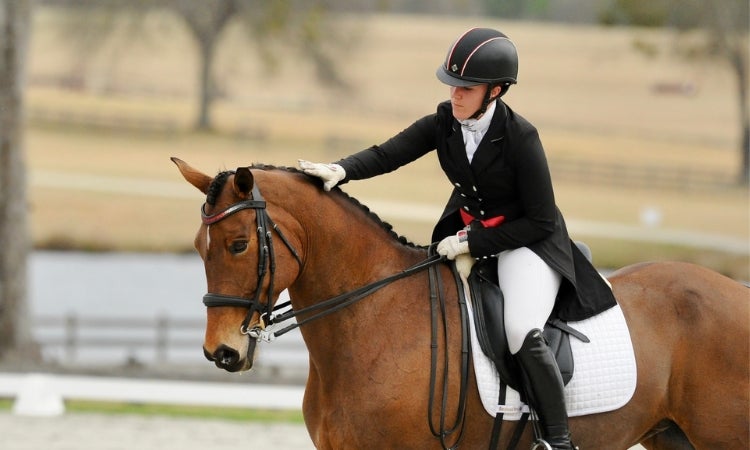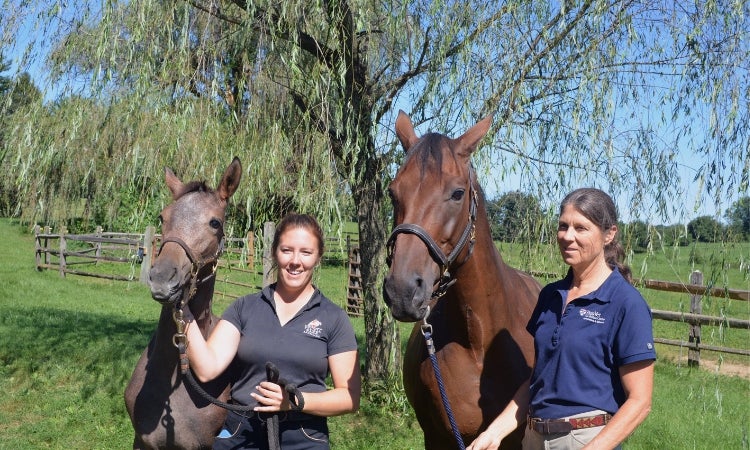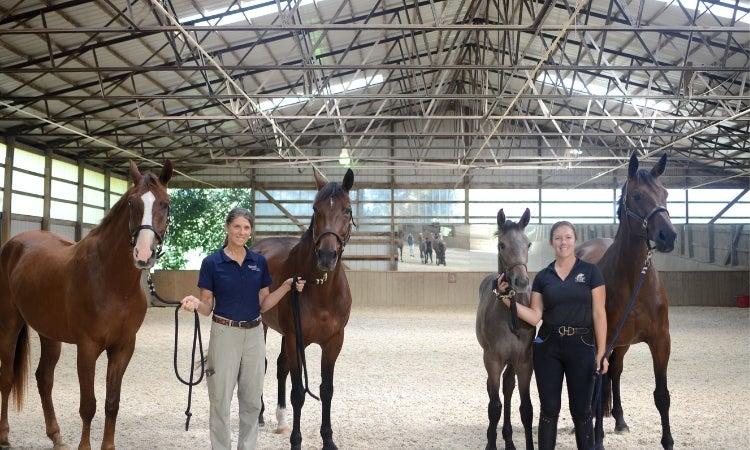From $500 Craigslist Castoff to Surprise Champion, Penn Vet’s Equine Assisted Reproduction Program Helps Create a Legacy

Faculty In This Story
Fylicia Barr was a horse crazy kid with not much money but high hopes. Sunny was a wild young mare with no training – just a load of sass and ideas of her own. The first time Fylicia met Sunny, the mare kicked her.
But there was a ton of talent and even more heart hiding under all that attitude, just waiting for her person to come along. Fylicia’s mom Shannon, a nurse who wanted to help her daughter’s dreams come true, found the horse on Craigslist. The price was right: $500. That’s pretty rock bottom in the equestrian world.
Yet that was only the beginning of this fairy tale – a kind of Cinderella and Rocky story rolled into one. Fylicia, still a teenager, set out to train her feral mare. “I didn’t really know what I was doing,” she said. Headstrong Sunny did her share of teaching, too. A bond was formed.
“We kind of grew up together.”
And together, a young adult Fylicia and her irrepressible mare went charging into the highly competitive world of championship three-day eventing, an equestrian triathlon of dressage, cross-country and show jumping.
The pair kept advancing, winning the prestigious four-star Jersey Fresh International Three-Day Event in 2019.
Then Fylicia’s childhood dream came true: she and Sunny competed in the five-star Land Rover Kentucky Three-Day Event. One of the international sport’s most prestigious and grueling contests, few ever qualify. Amid a field of world-class steeds, the equestrian press was buzzing about the $500 Craigslist horse.

Sunny seemed like a once-in-a-lifetime wonder horse.
One person didn’t see why the wonder had to end with Sunny.
Regina Turner, now professor emerita in the Section of Large Animal Reproduction and Behavior at Penn Vet’s New Bolton Center, had known Fylicia for years. Turner and her daughter both took lessons with Fylicia while on their own amateur eventing journeys. By this time, Fylicia, only recently turned 30, had built her own business, Fylicia Barr Eventing, out of a barn she rents in Unionville, Pa.
“Fylicia’s such a good human, and she cares so much about the people and the horses that she works with,” Turner said.
Turner also knew plenty about special horses. An expert in equine reproduction, she had worked with numerous highly competitive sport horse mares and stallions and was eager to help Fylicia and Shannon continue Sunny’s line. She also had the backing of Penn’s Equine Assisted Reproduction Laboratory (PEARL). PEARL, headed by Katrin Hinrichs, Harry Werner Endowed Professor of Equine Medicine and Chair of the Department of Clinical Studies at New Bolton Center, was ready to help with whatever cutting-edge laboratory methods were needed to help Sunny and Fylicia.
Sunny, though, wasn’t exactly typical of the horses helped by the clinicians of the New Bolton Center reproduction program. Often the program is called on to assist with champion Arabians or Quarter Horses, Standardbreds, and other eventing, dressage or show jumping horses, often with distinguished bloodlines. Sunny’s lineage is obscure at best. Officially named Galloway Sunrise for a barn that no longer exists, her father was a Thoroughbred. Her mother’s origin is a bit of a mystery – some Clydesdale, some Paint. Fylicia usually called Sunny an American Warmblood and left it at that.
Yet the bay mare had strengths that went beyond breed. Sunny was always a great athlete and an outstanding performer, Turner said. But Sunny also had the heart of winner.
“You have to have a horse that wants to do the job, that is excited to run cross country and jump those big jumps,” said Turner. “You’ve got to have a horse that is brave.”
Sunny was all that. She was also still very much at the top of her own career, ready to take on more international five-star courses. Her humans did not want to cut that short to breed her or interrupt her progress with an 11-month pregnancy, despite the appeal of creating a Sunny legacy.
Penn Vet assisted reproductive science steps in to help a special horse
That’s where PEARL and Turner’s expertise came in. Indeed, had it not been for Turner, Fylicia says she doubts they would have been able to breed Sunny.
“Regina was just so incredibly helpful. She really took the reins on it,” Fylicia said. “She held my mom’s and my hands, and was like, ‘This is how we’re going to do it, and it’s going to be easy and fun.’ And it has been. She’s been helping us every step of the way.”

PEARL offers various assisted reproduction options. These include vitrification, or freezing, of equine embryos, as well as intracytoplasmic sperm injection (ICSI), a procedure pioneered by Hinrichs. For ICSI, unfertilized eggs, or oocytes, are recovered directly from a mare’s ovaries, matured in the lab and injected with individual sperm from the chosen stallion. Newly created embryos are then grown in the lab until they can either be transferred to a recipient, or surrogate, mare or vitrified and stored for future transfer.
An advanced reproductive technology, ICSI is often used for mares unable to get pregnant due to various reproductive problems or when sperm supply is an issue. Sunny’s issues, however, were bound up in career and time, not reproductive health. She was a good candidate to have foals with the help of standard embryo transfer – breeding Sunny, flushing her embryo, and transferring it to a recipient mare.
Fylicia’s mother Shannon took on the job of finding a stallion whose strengths were good compliments to Sunny’s talents and obtained frozen semen. A horse lover herself who still lives in western New York where Sunny and Fylicia’s story began, Shannon has a gift for uncovering the happy ending in a dubious tale.
She had bought a not-too-successful racehorse named Kitty at the urging of a trainer from one of the local racetracks.
“He called me and said, ‘Hey, I just need to make sure she finds a good home, (otherwise) she’s going to end up in a bad place.’ They all know I’m a softy, So I said, ‘I’ll take her.’”
Kitty became Sunny’s first recipient mare.
Turner’s initial step in preparing for Sunny’s first foal was to monitor the mare’s reproductive cycle. In assisted reproduction through embryo transfer, frozen semen is inseminated far into a donor mare’s uterus, close to the opening of the fallopian tube, or oviduct, within a few hours of ovulation. If all goes well, the ovulated egg is fertilized in the oviduct, and the resulting embryo descends into the uterus several days later. Eight days after ovulation, the mare’s uterus is flushed with an embryo-safe fluid in the hope that a viable embryo will be present. The recovered fluid is filtered to trap the microscopic embryo, and the filter is searched under a microscope. If an embryo is found, it is either transferred to a recipient mare within hours of recovery, or frozen and transferred later when a recipient becomes available. In Sunny’s case, the embryo was transferred immediately.
Creating a spirited line

That process produced Sunny’s first offspring, a now four-year-old chestnut gelding named Zodak Vindico – known to everyone simply as Vinny.
The first try worked so well, Team Sunny decided to give embryo transfer another go. And once more, Sunny surprised her people.
“Being the overachiever she is, she ovulated three eggs in a cycle,” Fylicia said.
“That’s very unusual for a horse to do,” Turner acknowledged. “We bred her with frozen semen, and we got three embryos, which also almost never happens.”
Since only one recipient mare, Amelia, was available, only one of the three embryos could be transferred after the flush. Turner reached out to Matheus Felix, PEARL’s chief embryologist, who vitrified, or froze, the other two embryos until recipients could be found. Amelia went on to have Sunny’s second foal, a filly named Pepper. One of the frozen embryos proved later to not be viable but the other was thawed and transferred a year later when Amelia was again available. This frozen embryo, with Amelia’s help, subsequently produced Sunny’s third foal, a filly foal named Piper.
Sunny now has a total of three offspring, all by embryo transfer; Vinny, Pepper – aka Zodak Sunny Skies – who is now two years old, and a bay like her mother. Piper, the youngest, officially Zodak Partly Cloudy, was born earlier this year. She’s a mottled gray now but Fylicia expects she’ll lighten as she matures.
All of Sunny’s offspring are quite young, but Fylicia, Shannon and everyone in their camp are hopeful for their futures. Vinny, the four-year-old, recently started his first competitions and has already won one.
Fylicia doesn’t believe in beginning serious training for her horses too early, so Pepper and Piper still have time to frolic. And although all three foals were mothered by their surrogate mares, they’re each displaying unmistakable signs of Sunny’s singular spirit.
“It’s that same very bold, very confident, very curious mentality. All her babies seem to have it,” Fylicia said. “It’s interesting because she didn’t raise any of them. So it’s cool to see them have that bravery.”
Vinny, for example, displays some of Sunny’s bolder mannerisms. “He’s a mobster,” Fylicia said.
Pepper, meanwhile, even has Sunny’s coloring, down to her white socks.
Piper the baby is fearless, just like her mom. Last summer, even though she was not yet quite weaned from Amelia, Piper wasn’t at all shy about demanding treats from visiting strangers.
“Most babies are more leery of people and new things,” Fylicia said. “She definitely wants to be the boss.”
Meanwhile, Sunny, now 17, is still competing. Fylicia has partnered Sunny with a young local rider, Rylie Nelson. Not a horse who takes to everyone, Sunny and Rylie have formed a strong bond. They’re successfully competing in eventing at the intermediate level. Between Rylie’s skill and Sunny’s drive and talent, Rylie is now ranked among the top 10 Young Riders in the nation at the intermediate level.
When might it be Sunny’s time to retire? As with many other things, Fylicia’s going to let her equine partner have her say in that.
“I don’t want to make a guess,” Fylicia said. “It could be 10 years from now. It could be two years. If I thought she’d be happy in retirement, she’s certainly earned it. But she’s not ready yet. She’ll let us know.”
Related News

Moving Closer to ‘True’ Equine IVF for Clinical Use
Katrin Hinrichs, Harry Werner Endowed Professor of Equine Medicine, and colleagues developed a technique that would allow successful conventional in vitro fertilization (IVF) with horses.

Newly Identified Gene Deletion in Standard Poodles Sheds Light on Severe Vision Disorder
Inherited retinal diseases form a broad and complex group of genetic conditions that cause progressive vision loss and blindness. Dogs, like humans, are susceptible to many such disorders. Because of…

Vision Scientists at Penn Vet Launch DogAEye, a Novel AI-Based Tool To Improve Early Diagnosis of Retinal Degeneration in Dogs
Veterinary ophthalmologists and vision scientists at the University of Pennsylvania’s School of Veterinary Medicine (Penn Vet) have announced the release of DogAEye, an innovative artificial intelligence (AI)–based clinical decision support…
About Penn Vet
Ranked among the top ten veterinary schools worldwide, the University of Pennsylvania School of Veterinary Medicine (Penn Vet) is a global leader in veterinary education, research, and clinical care. Founded in 1884, Penn Vet is the first veterinary school developed in association with a medical school. The school is a proud member of the One Health initiative, linking human, animal, and environmental health.
Penn Vet serves a diverse population of animals at its two campuses, which include extensive diagnostic and research laboratories. Ryan Hospital in Philadelphia provides care for dogs, cats, and other domestic/companion animals, handling more than 30,000 patient visits a year. New Bolton Center, Penn Vet’s large-animal hospital on nearly 700 acres in rural Kennett Square, PA, cares for horses and livestock/farm animals. The hospital handles more than 6,300 patient visits a year, while our Field Services have gone out on more than 5,500 farm service calls, treating some 22,400 patients at local farms. In addition, New Bolton Center’s campus includes a swine center, working dairy, and poultry unit that provide valuable research for the agriculture industry.

